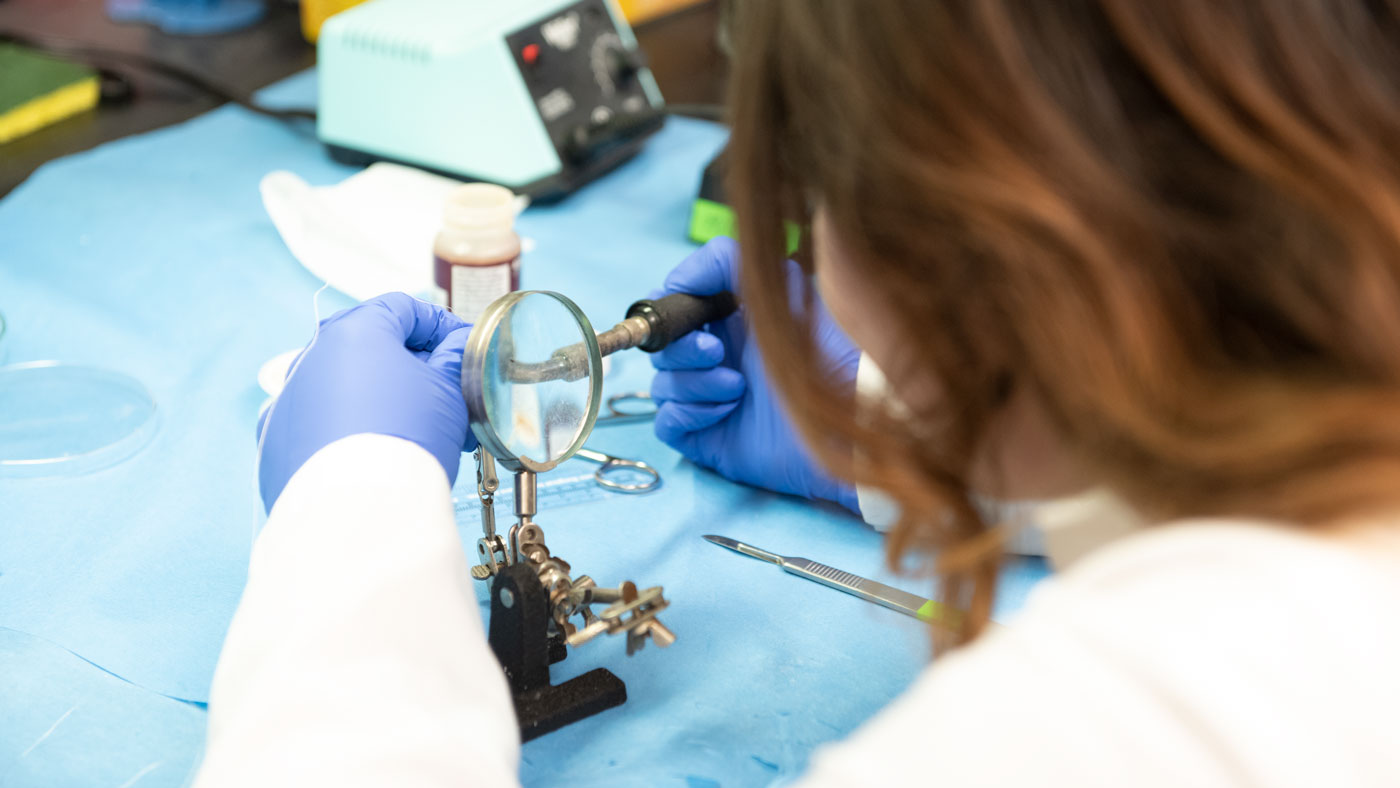Steven Finkbeiner and his lab study how brain cells learn and remember, and what causes them to malfunction or die in disease. The long-term goal is to understand how these normal functions go awry and cause neurological and psychiatric diseases. To this end, the lab has developed patient-derived models of several of them, including Huntington’s disease, Parkinson’s disease, Lewy Body Dementia, amyotrophic lateral sclerosis (ALS), frontotemporal dementia, Alzheimer’s disease, autism and schizophrenia. The group has also developed state-of-the-art technologies to generate and analyze large troves of images and genetic data, including robotic microscopy and artificial intelligence.
Disease Areas
Areas of Expertise

Lab Focus
Research Impact
Finkbeiner’s lab strives to understand the neurobiology of disease well enough to design rational interventions and produce effective treatments. They bring human biology into the lab by combining human genomics and the creation of human models of disease based on iPS cells and other patient material. The limitations of conventional approaches led them to invent new tools such as robotic microscopy, and to adapt artificial intelligence to unravel cause and effect in complex mechanisms and gain insights from data that elude comprehension by the unaided human brain.
The work has led to seminal findings for the field and promising new therapeutic approaches. In one instance, robotic microscopy helped resolve a decade-old controversy about the pathogenesis of Huntington’s disease. In another, new biosensor technology helped design neuroprotective compounds that cause cells to destroy disease-causing proteins linked to Alzheimer’s, Parkinson’s and Huntington’s disease.
Professional Titles
Director, Gladstone Center for Systems and Therapeutics
Senior Investigator, Gladstone Institutes
Director, Hellman Family Foundation Alzheimer’s Disease Research Program, Gladstone Institutes
Director, Taube/Koret Center for Neurodegenerative Disease Research, Gladstone Institutes
Professor, Department of Neurology, UC San Francisco
Bio
Steve Finkbeiner, MD, PhD, is director of the Center for Systems and Therapeutics and a senior investigator at Gladstone Institutes. In 2009, with support from Bay Area philanthropists, he established the Taube/Koret Center for Neurodegenerative Disease Research at Gladstone to accelerate the development of drug therapies for patients suffering from conditions such as Huntington’s disease. Finkbeiner is also director of the Hellman Family Foundation Alzheimer’s Disease Research Program and an investigator in the Roddenberry Stem Cell Center at Gladstone. In addition, he is a professor of neurology and physiology at UC San Francisco (UCSF).
Finkbeiner earned a bachelor’s degree from Wheaton College, and earned both an MD and a PhD in neuroscience from Yale University. He completed an internship in internal medicine and chief residency in neurology at UCSF, followed by a research fellowship at Harvard Medical School.
Finkbeiner is an associate editor of the journal Autophagy and serves on the editorial board of the Journal of Huntington’s Disease and BioMed Central. He has received numerous awards for his work and is a member of several scientific and professional societies, including the American Neurological Association, the Society for Neuroscience, the Society for Cell Biology, and the Biophysical Society.
His expertise encompasses neurodegenerative and psychiatric diseases, iPSC modeling, human genetics, robotics, imaging, computational methods and artificial intelligence. He is known for inventing robotic microscopy, a platform for performing high-throughput longitudinal single-cell analysis, and for a series of discoveries about the biology of disease made with this approach.
How Did You Get Your Start in Science?
“I fell in love with engineering playing with Lego, and my 8th grade science teacher took an interest in me, spurring my interests in science and medicine.”
Honors and Awards
2023 Essey Award Champions for Cures and Care, The California ALS Research Network, ALS Association
2022 Leslie Gehry Prize for Innovation in Science
2017 Javit’s Award from the National Institutes of Neurological Disorders and Stroke Award Outstanding and Innovative Contributions to Neurological Disease Research
2017 Commitment to a Cure Award, ALS Association Golden West Chapter
2011 Award for Outstanding Research Achievement, Nature Biotechnology
2010 Thomson Reuters - The most cited primary research paper in Neuroscience and Behavior for the preceding 10-year period
2008 UCSF Annual Outstanding Faculty Mentorship Award, Graduate Student Association, UC San Francisco
2008 Distinguished Leadership Award, Huntington’s Disease Society of America
2005 Therapeutics Initiative Award, Huntington’s Disease Society of America
2005 Taube Prize for Outstanding Work on Huntington’s Disease
2005 Lieberman Award for Outstanding Work in Huntington’s Disease
2001 W.M. Keck Research Excellence Award
2001 Klingenstein Award in Neuroscience
1999 Charles E. Culpepper Medical Scholar Award
Publications
Contact
Steve Finkbeiner
Email
415.734.2508
Gayane Abramova
Administrative Specialist
415.734.2689
Email

